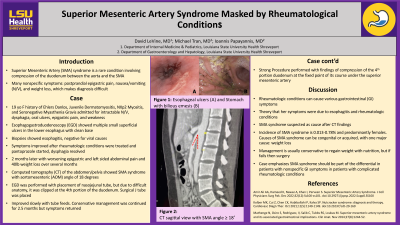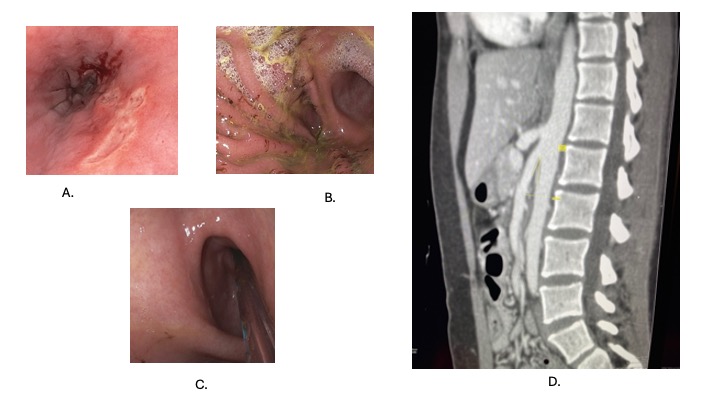Tuesday Poster Session
Category: Small Intestine
P5032 - Superior Mesenteric Artery Syndrome Masked by Rheumatological Conditions
Tuesday, October 29, 2024
10:30 AM - 4:00 PM ET
Location: Exhibit Hall E


David LeVine, MD
Ochsner LSU Health
Shreveport, LA
Presenting Author(s)
David LeVine, MD, Michael Tran, MD, Ioannis Papayannis, MD
Ochsner LSU Health, Shreveport, LA
Introduction: Superior Mesenteric Artery (SMA) syndrome is a rare condition involving compression of the duodenum between the aorta and the SMA. It has many nonspecific symptoms: postprandial epigastric pain, nausea/vomiting (N/V), and weight loss, which makes diagnosis difficult. We present a case of SMA syndrome diagnosed in a female with many rheumatologic conditions that can present with similar symptoms.
Case Description/Methods: 19-year-old female with history of Ehlers Danlos, Juvenile Dermatomyositis, NXp2 Myositis, and Seronegative Myasthenia Gravis who presented with N/V, dysphagia, oral ulcers, epigastric pain, and weakness. Esophagogastroduodenoscopy (EGD) showed multiple small superficial ulcers in the lower esophagus with clean base. Biopsies showed esophagitis, negative for viral causes. She was placed on pantoprazole and improved after rheumatologic conditions were treated. Dysphagia resolved. She returned 2 months later with worsening symptoms, epigastric and left sided abdominal pain and 40lb weight loss over the months. Admitted for rheumatologic flares again. Computed tomography (CT) of the abdomen/pelvis showed SMA syndrome with aortomesenteric (AOM) angle of 18 degrees. Surgery recommended conservative management. EGD was performed with placement of nasojejunal tube, but due to difficult anatomy it was clipped at the 3rd portion of the duodenum. Eventually surgical J tube was placed. Patient improved slowly with tube feeds. Conservative management was continued for 2.5 months but she continued to have epigastric pain with N/V. Patient underwent elective Strong Procedure with findings of compression of the 4th duodenum at the fixed point of its course under the superior mesenteric artery, consistent with SMA syndrome.
Discussion: Rheumatologic conditions can cause gastrointestinal (GI) symptoms like epigastric pain, N/V, and dysphagia. With constant N/V and inability to eat, weight loss is inevitable. It was thought that her symptoms were due to esophagitis and her rheumatologic conditions. After CT was completed, her symptoms could have been due to SMA syndrome. Incidence of SMA syndrome is 0.013-0.78% and predominantly females. Causes of SMA syndrome can be acquired or congenital, with one major cause: weight loss. Management is usually conservative to regain weight with nutrition, but if that fails then surgery. This case emphasizes that SMA syndrome should be part of the differential in patients with nonspecific GI symptoms in patients with complicated rheumatologic conditions.

Disclosures:
David LeVine, MD, Michael Tran, MD, Ioannis Papayannis, MD. P5032 - Superior Mesenteric Artery Syndrome Masked by Rheumatological Conditions, ACG 2024 Annual Scientific Meeting Abstracts. Philadelphia, PA: American College of Gastroenterology.
Ochsner LSU Health, Shreveport, LA
Introduction: Superior Mesenteric Artery (SMA) syndrome is a rare condition involving compression of the duodenum between the aorta and the SMA. It has many nonspecific symptoms: postprandial epigastric pain, nausea/vomiting (N/V), and weight loss, which makes diagnosis difficult. We present a case of SMA syndrome diagnosed in a female with many rheumatologic conditions that can present with similar symptoms.
Case Description/Methods: 19-year-old female with history of Ehlers Danlos, Juvenile Dermatomyositis, NXp2 Myositis, and Seronegative Myasthenia Gravis who presented with N/V, dysphagia, oral ulcers, epigastric pain, and weakness. Esophagogastroduodenoscopy (EGD) showed multiple small superficial ulcers in the lower esophagus with clean base. Biopsies showed esophagitis, negative for viral causes. She was placed on pantoprazole and improved after rheumatologic conditions were treated. Dysphagia resolved. She returned 2 months later with worsening symptoms, epigastric and left sided abdominal pain and 40lb weight loss over the months. Admitted for rheumatologic flares again. Computed tomography (CT) of the abdomen/pelvis showed SMA syndrome with aortomesenteric (AOM) angle of 18 degrees. Surgery recommended conservative management. EGD was performed with placement of nasojejunal tube, but due to difficult anatomy it was clipped at the 3rd portion of the duodenum. Eventually surgical J tube was placed. Patient improved slowly with tube feeds. Conservative management was continued for 2.5 months but she continued to have epigastric pain with N/V. Patient underwent elective Strong Procedure with findings of compression of the 4th duodenum at the fixed point of its course under the superior mesenteric artery, consistent with SMA syndrome.
Discussion: Rheumatologic conditions can cause gastrointestinal (GI) symptoms like epigastric pain, N/V, and dysphagia. With constant N/V and inability to eat, weight loss is inevitable. It was thought that her symptoms were due to esophagitis and her rheumatologic conditions. After CT was completed, her symptoms could have been due to SMA syndrome. Incidence of SMA syndrome is 0.013-0.78% and predominantly females. Causes of SMA syndrome can be acquired or congenital, with one major cause: weight loss. Management is usually conservative to regain weight with nutrition, but if that fails then surgery. This case emphasizes that SMA syndrome should be part of the differential in patients with nonspecific GI symptoms in patients with complicated rheumatologic conditions.

Figure: A. Esophageal ulcer
B. Stomach with bilious vomit
C. Nasojejunal tube placement
D. CT scan showing SMA syndrome
B. Stomach with bilious vomit
C. Nasojejunal tube placement
D. CT scan showing SMA syndrome
Disclosures:
David LeVine indicated no relevant financial relationships.
Michael Tran indicated no relevant financial relationships.
Ioannis Papayannis indicated no relevant financial relationships.
David LeVine, MD, Michael Tran, MD, Ioannis Papayannis, MD. P5032 - Superior Mesenteric Artery Syndrome Masked by Rheumatological Conditions, ACG 2024 Annual Scientific Meeting Abstracts. Philadelphia, PA: American College of Gastroenterology.
